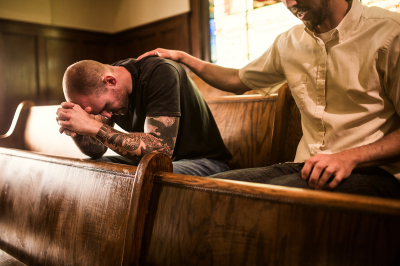My child was almost abducted. This is how I learned to forgive

Jesus tells us to love our enemies, and I was in favor of living this way until an enemy tried to abduct my daughter and one of her friends as they were walking home from school.
A policeman and a detective sit with my daughter as she looks through 30 large photos. It's a lineup done with piles of pictures, a heap of headshots filled with guilty people who have abducted children, and worse. This place is not Hell, but it feels like each image is a small window into it.
“Take your time and see if any faces look like the person driving the car,” officer Whittaker said.
“It was a man so you can take out all the pictures of women. He was a skinny person. And no beard either,” Casey said in a tiny voice.
Casey is 14, and our house is less than a mile from her school. There's a walking path that connects the school to our neighborhood, one we felt was safe until two days ago. Casey was walking home with a friend and was eight houses from our driveway when a man driving a black Honda passed the girls, driving slowly, watching them. He drove to the end of the street, turned around, and drove by the girls again, staring longer, driving slower. He turned his car around again, pulled up beside the girls, and stopped. The man's motives were as clear as the video footage caught on our neighbor's security camera. It shows the drivebys, the car slowing, the man leering, the car stopping, the man's intent to take them, and the girls fleeing.
That day, God placed two people in our lives who saved my daughter. The first was a County Sheriff who lives on our street. He had taken the day off from work to wash the windows on the back of his house, the windows that face the walking trail Casey and her friend were on.
Had it been any other day, had he not taken the day off, had his windows been a little less dirty, the events of this day would have ended much differently.
The second person was Mrs. Smithton, the mother of the girl Casey was walking home with. Track practice had run long this afternoon, and when Casey's friend hadn't walked through the front door of her house on time, her mother walked out of the front door to find her.
Had Mrs. Smithton kept waiting, had she kept wondering, had she not gone out her front door to find her daughter, the events of this day could have ended much differently.
“I thought, am I seeing this go down? Is this going down?” Mitchel, the County Sheriff, said.
Mitchel recognized what was unfolding in front of him, and he did what first responders do whenever there is a danger the rest of us run from. He ran toward it. I think Mitchel was afraid he'd be too slow on foot; afraid the man would get away with one or both of the girls. I believe this because Mitchel didn't just run. Mitchel got in his car and drove to intercept the black Honda.
Mitchel realized what was happening, and the girls realized it, too. The girls moved quickly past the man in the black Honda, but this alone didn't deter him. The video footage that Mitchel's back door security camera captured didn't just show the man stopping. As the girls work to escape, you can see the man put the car in reverse and keep pace with them. As the black Honda drove backward, Mitchel turned the corner, driving forward toward the girls. Though she didn't realize it, Mrs. Smithton was moving toward the black Honda from the other direction and saw the girls hurrying toward her.
Spooked by Mrs. Smithton's car, Mitchel determined driving, or perhaps the girl's reaction, the man in the black Honda drove away, and the girls were safe.
As Casey looked through the lineup, she said she felt scared. I felt sick. A sick feeling in my stomach grew larger with each detail the detective disclosed. The horrible things men like this one were doing in and around us every day. The active sex trafficking ring and the thriving trade of taking teens. All of these details scared sleep from me for weeks and shook my trust in my family's safety for months.
In time, we returned to our routines. My daughter returned to school, my wife returned to work, and I returned to the book I was writing, a book about loving our enemies. Only I didn't return because I couldn't write. The words wouldn't come. The words wouldn't come to the page, and they wouldn't come in my prayers.
My family faced an enemy, and Jesus' telling us to love our enemies was hard to understand. Did Jesus expect me to love the person who tried to take Casey? Did he want me to pray for the man who wanted to do horrible things to my daughter? I was numb to the idea. I tried to be faithful. I bowed my head, folded my hands, and knelt beside my desk to pray. I wanted to ask for wisdom, to ask for guidance but the words weren't there. I couldn't do it. I sat in silence as hot tears ran down the sides of my face and anger burned in my heart.
Have you been there? Has evil found you where you live? Maybe your neighborhood has changed too? Perhaps you've experienced a break-in where the thief took your belongings and, along with them, your sense of safety. Maybe you lost something sacred, like your innocence, or you experienced abuse or an attack that left you bruised, beaten, or broken. What do we do when shock fades and anger moves into the silent spaces? How are we expected to pray for our enemies when we find no understanding in the kneeling and the words won't come?
For me, the answer has come with time. No Damascus moment imbued with blinding light. No booming voice spoke as I knelt next to my desk that morning — no earthquake or eclipse of the Sun.
Instead, God revealed a truth to me gradually, like a half-burnout caution light, blinking slowly, steadily, and on repeat. Since the police were not able to catch the man, we could only speculate on his motives for trying to take Casey. We learned that other people caught for this crime are typically at the end of their rope. This man likely needed money or drugs, needed them so badly that he was willing to do horrific things to get them. He was an attempted abductor, that was factual, but there was something else about him that was truer. He was desperate.
I kept thinking about how we didn't know the abductor's name. I kept thinking about how desperate the man was, and for some reason, I stopped calling the man “Abductor” and started calling him “Desperate.” When I did this, something changed.
There is a distance between enemy and friend. It's a distance that feels far but is closer than we think. God gives us a power we can use to close this distance. It's the power to rename our enemies.
God's known for renaming people. Paul, Peter, Abraham, Sarah, Jacob. God had a reason for renaming them. God wanted Abram to become a father of nations, so he gave him a name that meant just that. God changed Sarai to Sarah to mark a new season in Sarah's life, a season of having a son. God changed Jacob's name, which meant usurper, to Israel, meaning one who prevails with God. Throughout history, God has renamed people. Simon lied, denied, and doubted. Simon doesn’t sound solid, and maybe that's why Jesus changed his name to Peter, which meant “The Rock.”
And what about Saul, who is changed to Paul days after he'd walked in the dust of the Damascus road? I've read disagreements and theories about when and why Saul's name change occurred. Some people believe it resulted from his encounter with Jesus; others think it was just a translation into a different language. No matter which side of that argument you land on, one thing is clear. Saul began as a murderer of Christians and eventually became Paul, who loved Christians. Why were they given new names?
Could Sarah believe in a child more than Sarai? Could Abraham father nations better than Abram? Was the name change for Jesus? Saul was easy to hate; was Paul easier to love? No. The name change wasn't for Jesus; it was for us. Jesus can love Saul and Paul and Simon and Peter the same, but we can't.
When I learned how desperate the abductor was, I renamed him. I couldn't love “abductor.” I hated “abductor.” But “desperate” ... I found a small mustard seed-sized ounce of compassion for “desperate.” The distance between me and abductor is long, a road I don't want to travel and a distance I can't overcome. The distance between me and desperate is shorter, even if only by a step or two.
There was something else too. As the words returned to the page and to my prayers, I discovered I had something in common with the enemy I had renamed. We shared a name. I’m not an abductor, but I am desperate. I doubt the abductor knows it, but we are both desperate. Desperate for a savior.
You may not have an enemy, but we all have someone we don't like. The school board member who is scamming the system, the horrible hack managing the homeowner’s association, or the deacon downplaying the role of women at church. Each has a name by which we've come to know them. Some are called bullies, some gossip or backstabbers. Some we call lazy, arrogant, or mean. We've given each a name, and most of the names make it harder for us to love them.
What if we renamed them? I think you will find that this simple act reduces the distance. We need to do some renaming. We need to close the distance between enemy and friend. Only then can we learn to love the people Jesus died for. People desperate for a savior. People like me and the County Sheriff living on my street. People like you and the people who have hurt you. People Jesus died for, like my daughter and the other desperate people all around us — the ones we keep calling our enemies.
Bryan Crum is the author of Neighbor, Love Yourself: Discover Your Value, Live Your Worth (WaterBrook; on sale 6/18/24). He spent a decade as a hospice chaplain, helping people reflect on life, confront their mortality, and embrace a savior who is waiting for all of us with open arms. Having listened to hundreds of life stories, he realized too many of us carry regret. He decided to be the guy who spotlights the true words written in bold on our inner framework by our Creator, which somehow have gone unnoticed. He has a bachelor’s degree in biblical studies, an MBA from ITT Tech, and certifications from Harvard University in bioethics and world health, but the most important things Bryan learned while sitting at the bedside of dying people. Bryan lives in Ohio with his wife and daughter. Visit him at bryancrum.com and instagram.com/bryan_crum_




























